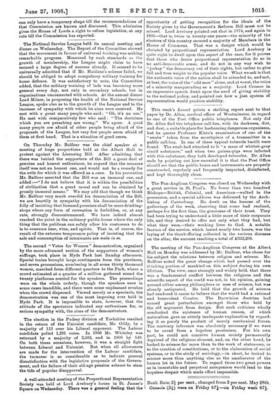The meeting of the Pan-Anglican Congress at the Albert Hall
_on Monday was addressed by Mr. Balfour, who chose for his subject the relations between religion and science. Mr. Balfour noted the great change which had passed over the thinking portion of mankind on this subject during his own lifetime. The view, once strongly and widely held, that there was a fundamental conflict between the religious and the scientific aspect of the world was not, in his opinion, gaining ground either among philosophers or men of science, but was already antiquated. He held that the growth of science bad rendered it easier to believe that the world had a rational and benevolent Creator. The Darwinian doctrine had caused great perturbation amongst those who held by the old argument from design. But such criticism wholly overlooked the existence of human reason, of which naturalism gave an utterly inadequate explanation by regard- ing it as purely the product of merely mechanical forces. The contrary inference was absolutely necessary if we were to be saved from a hopeless pessimism. For his own part, be could not conceive human society permanently deprived of the religious element, and, on the other band, he looked to science far more than to the work of statesmen, or to the creation of constitutions, or to the elaboration of social systems, or to the study of sociology,—in short, he looked to science more than anything else as the ameliorator of the human lot in the future. To regard these two great powers as in immutable and perpetual antagonism would lead to the hopeless despair which made effort impossible.






















































 Previous page
Previous page